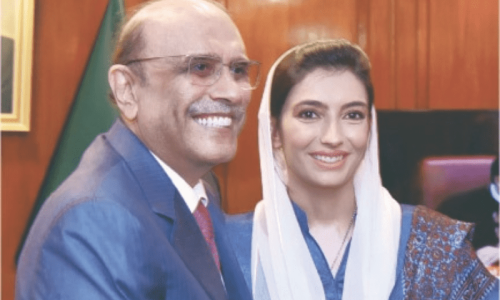KARACHI: The Voice of Missing Baloch Persons, an advocacy group working for the rights of missing persons in Balochistan, has raised concerns regarding the recently established military courts.
Speaking at a press conference held at the Karachi Press Club on Saturday, the vice chairperson of the VOMBP, Abdul Qadeer Baloch, said: “We have fears that the military courts will be used against the Baloch, Sindhi and Pashtun nationalist workers.”
“It’s been 1,859 days since I put up a protest camp outside the Karachi Press Club, then Quetta Press Club and then the National Press Club in Islamabad, demanding attention from the authorities and the media alike for the recovery of those missing from Balochistan,” Mr Baloch, also known as Mama Qadeer, said.
Giving estimates, he said that within the past 10 years the number of missing persons from Balochistan “has increased to 21,000”. The number given by the Human Rights Commission of Pakistan was around 700, he said, adding that “it is an old figure because the HRCP is not allowed to visit certain places for security reasons”.
He said last year was the most “horrific in terms of ‘kill and dump’ and the number of men who went missing from Turbat and Quetta”.
He said people from “civilian areas were picked up in the name of operation”.
Quetta’s Sariab Road, Brewery Road, Satellite Town, Hazar Ganji, New Kahan and Kili Khalifa had seen a large increase in the number of men picked over suspicion by the security forces, he said.
Men had also gone missing from Turbat, Kulanch, Panjgur and Awaran in recent months an “as a result of it, a large number of people have migrated from Turbat to Bela, Uthal, Hub and Karachi”, he said.
Speaking about a recent surge in radicalisation in Panjgur, Pasni and parts of Gwadar, he said: “Reports about the presence of Daish (Islamic State militant group) is also doing the rounds. The group claimed responsibility for the killing of a school principal in Gwadar, Zahid Askani, in December.”
Replying to a question, he said: “We don’t pursue the higher courts or meet high ups because they don’t accept us as the citizens of this country.”
He said the unanimity shown by the politicians in agreeing to set up the military courts in the country was alarming “because we know who the usual suspects will be — Sindhi, Baloch and Pashtun nationalists. Can these politicians guarantee that the military courts won’t be used against the nationalists?”
Published in Dawn, January 11th, 2015
On a mobile phone? Get the Dawn Mobile App: Apple Store | Google Play













































